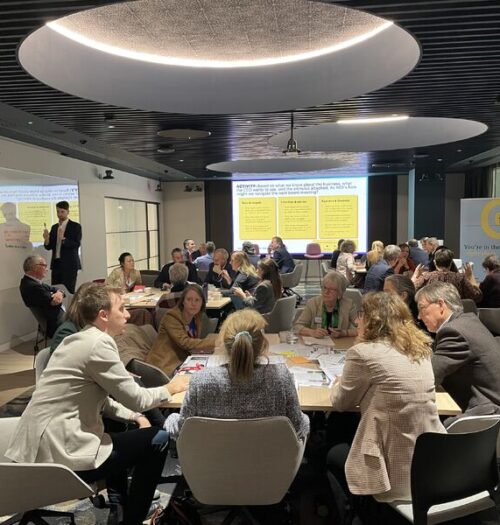
Embedding technology into your organisation’s net zero transition
The event focused on the transformative potential of technology in addressing climate challenges and strategies to leverage innovation for positive environmental impact. The two-part session began with an expert overview of the technologies being used to enable net zero, followed by a breakout group exercise where NEDs explored Generative AI (GenAI) applications in a simulated business case, to understand how these applications contribute positively to the organisation’s financial and reputational success, as well as meet its emissions reduction targets.
Julie Baddeley, Chair of Chapter Zero, opened the event by highlighting the critical role technology plays in successful transition planning, a strategic focus for Chapter Zero in 2023 and 2024. The importance of organisations harmonising technology with their long-term strategies for success was reinforced by Samantha Barber, Board Effectiveness and Sustainability Lead at Accenture, who outlined Accenture’s commitment to building a culture of fit-for-purpose and fit-for-future boards to lead the way in the climate transition.
Key takeaways for NEDs
- Technology can both drive emissions reductions and be a significant contributor to an organisation’s emissions footprint. It is important for NEDs to understand the value and impact of technology use cases in ways that align strategically with their organisation and its investors.
- NEDs can play a critical role in exploring more immediate opportunities to improve efficiency and effectiveness within their organisations through technology, utilising the boardroom as a space to bring potential solutions to the table.
- Demonstrate leadership at the board level to convey the importance of harnessing technology in alignment with the organisation’s strategy to meet its climate targets. The board should oversee and encourage collaboration across the teams within an organisation to drive a multidisciplinary approach to sustainability and tech.
Net zero technologies
Technology is a vast sector, which can be daunting for organisations looking to find solutions that fit their individual needs. NEDs highlighted that this can be especially challenging for mid-sized companies, who may not have the resources to commit to technology integration. The importance of large companies leading the charge in climate technology, and actively seeking out opportunities to support suppliers and co-invest in innovation, was underscored as key to driving economies of scale. Benchmarking was highlighted as a beneficial practice for organisations of all sizes, to gain a wider view of what competitors and industry leaders are doing, and how to best prepare for future technology developments. In particular, the technology to support Scope 3 emissions reductions was identified as an area for exploring collaboration more directly, considering that it currently presents a major challenge to organisations in terms of gaps in understanding and metrics.
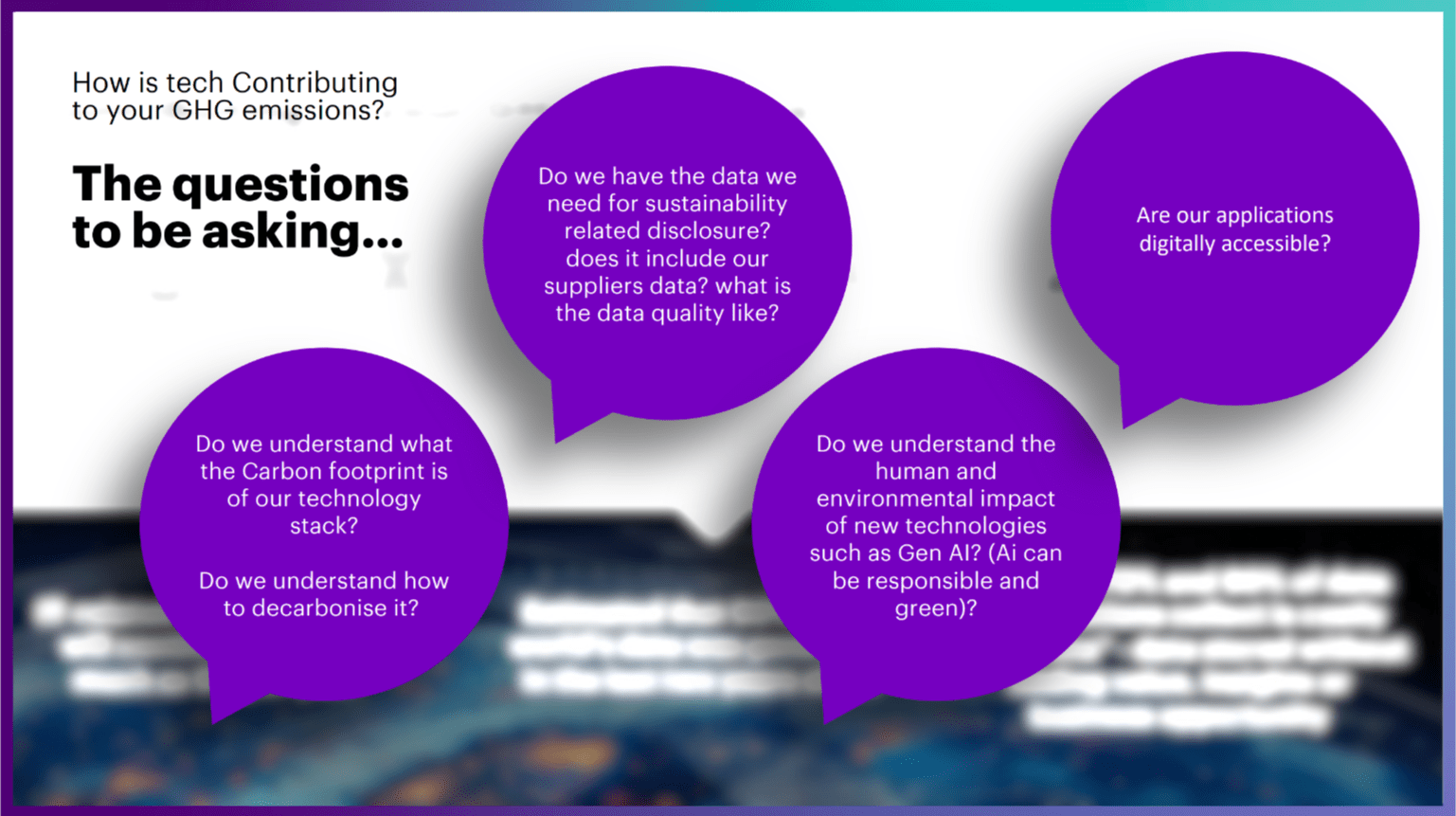
Specialists from Accenture offered practical examples of collaboration in the technology space, calling attention to the growth of industrial clusters and groups of organisations working together on innovative applications for various technologies, including in industries such as FinTech and NatureTech. This is representative of a growing focus on building ecosystems and consortiums, with a recognition that collaboration may be more impactful than focusing on maintaining competitive advantage. Reference was made to Microsoft’s Copilot tool and Accenture’s forthcoming ImpactGPT platform, both of which exemplify the digital resources and technology available to support boards with the ever-changing regulatory landscape. Sustainable technologies, both hard tech and information tech solutions (e.g. AI, Blockchain, Cloud, Data Analytics, Internet of Things, etc.), have the capacity to greatly accelerate change and value creation within organisations in a number of ways, including:
- Being able to embed Greenhouse Gas (GHG) emissions data into decision-making and ensure investment decisions align with achieving Net Zero
- Using insight to identify energy efficiencies & cost savings in operations
- Using GHG emissions data to identify climate risks and build resilience in the supply chain
Strategic focus on integrating technology may also provide pathways for organisations to forge ahead with long-term agendas for innovation in the face of uncertain regulatory environments—which can often distract attention away from what organisations can do in the here and now.
Deep dive: Generative AI
The deep-dive breakout exercise simulated a situation in which NEDs were asked to analyse the implementation of a GenAI technology in their organisation and identify how boards can make informed decisions on technology’s role in their organisation’s net zero transitioning. Considerations were broken down into how NEDs can support the development of data management and targets, prioritisation and advising on investment decisions, and the approval and oversight of implemented technology solutions.
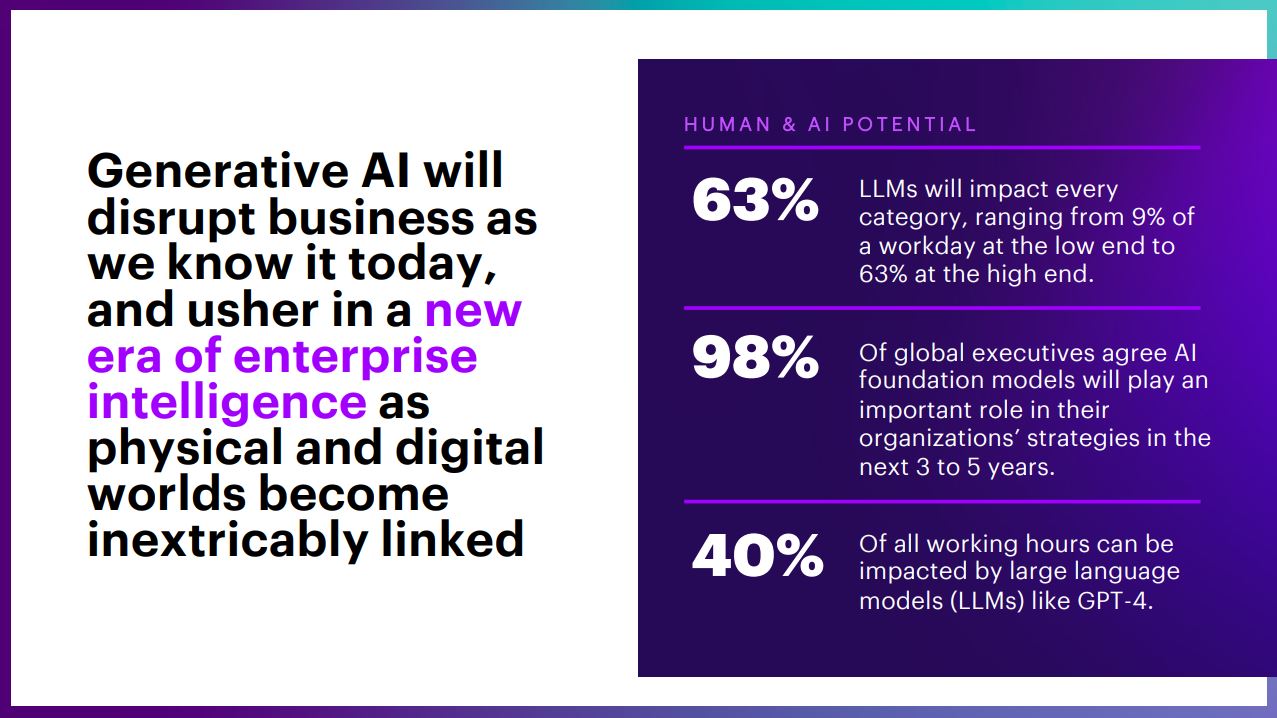
Leadership and culture
Breakout discussions centred around ensuring that well-functioning systems are in place to handle the technology developments an organisation pursues. It was recommended that NEDs promote a sequence way of thinking, taking a step-by-step perspective on technology potential, and avoiding implementing certain tech interventions in hopes of a quick fix to challenges. In viewing data as a major internal currency at the executive level, NEDs advised that greater clarity be presented on the data that feeds into large investment decisions and how this is validated and assured. NEDs were intent on making sure that investments in filling technology gaps are guided by strategic buy-in to technologies’ potential to both optimise current operations and drive new business opportunities, rather than solely streamline compliance requirements.
Multidisciplinary approach to sustainability and technology
NEDs expressed concerns around how the ambition for integrating sustainability tech is distilled across an organisation’s various teams. A particular concern was raised around the role of IT teams in supporting climate innovation, as this is not always operationally prioritised for these groups. Acknowledging that technology is a cross-cutting aspect of business, boards should look to be intentionally multidisciplinary in their approach to its strategic use, and work to embed this thinking across teams.
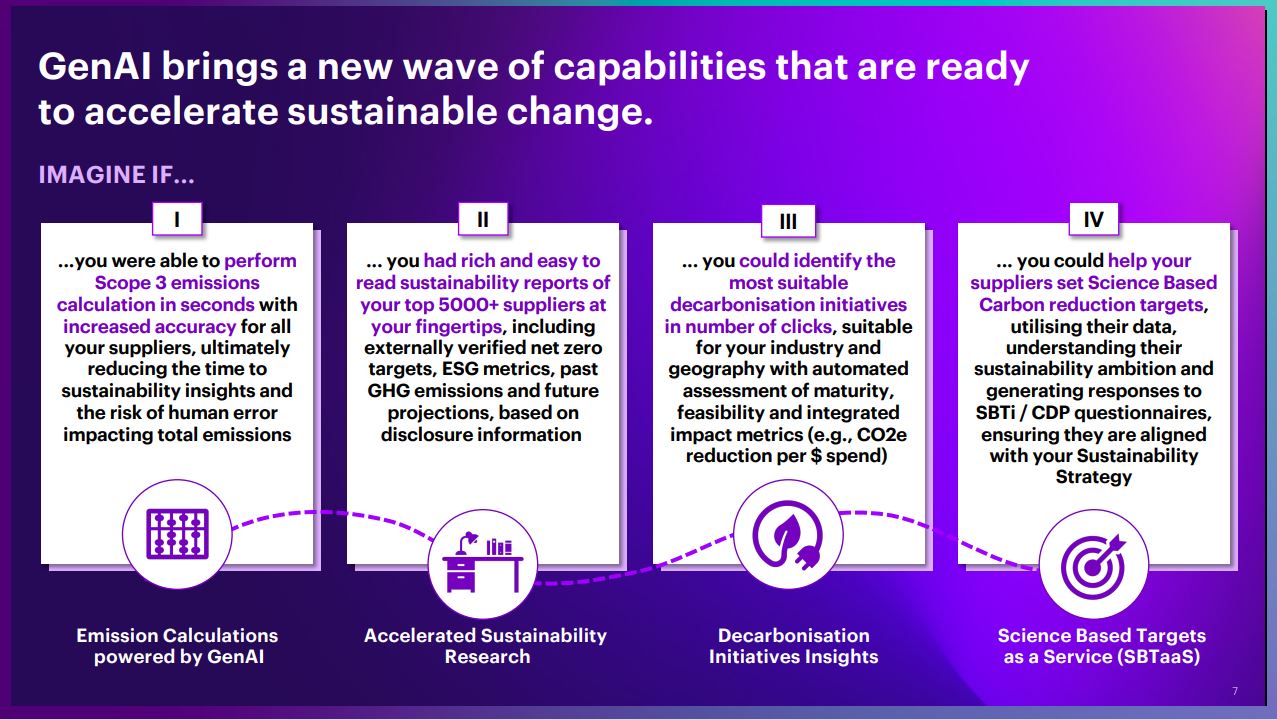
Challenges to overcome surrounding the ethics of some technologies
A number of concerns for integrating GenAI were also raised, including various ethical implications such as inherent bias in data, potential lack of controls, and the risk of false information, as well as the carbon impact of technology solutions themselves. Important distinctions were made between using GenAI within an organisation versus open source GenAI, with the overarching recommendation that human ingenuity is required to ensure the ethical use of these technologies. NEDs were signposted to resources from the Institute for Business Ethics and Green Software Foundation, which could be useful in guiding these conversations at the board level.
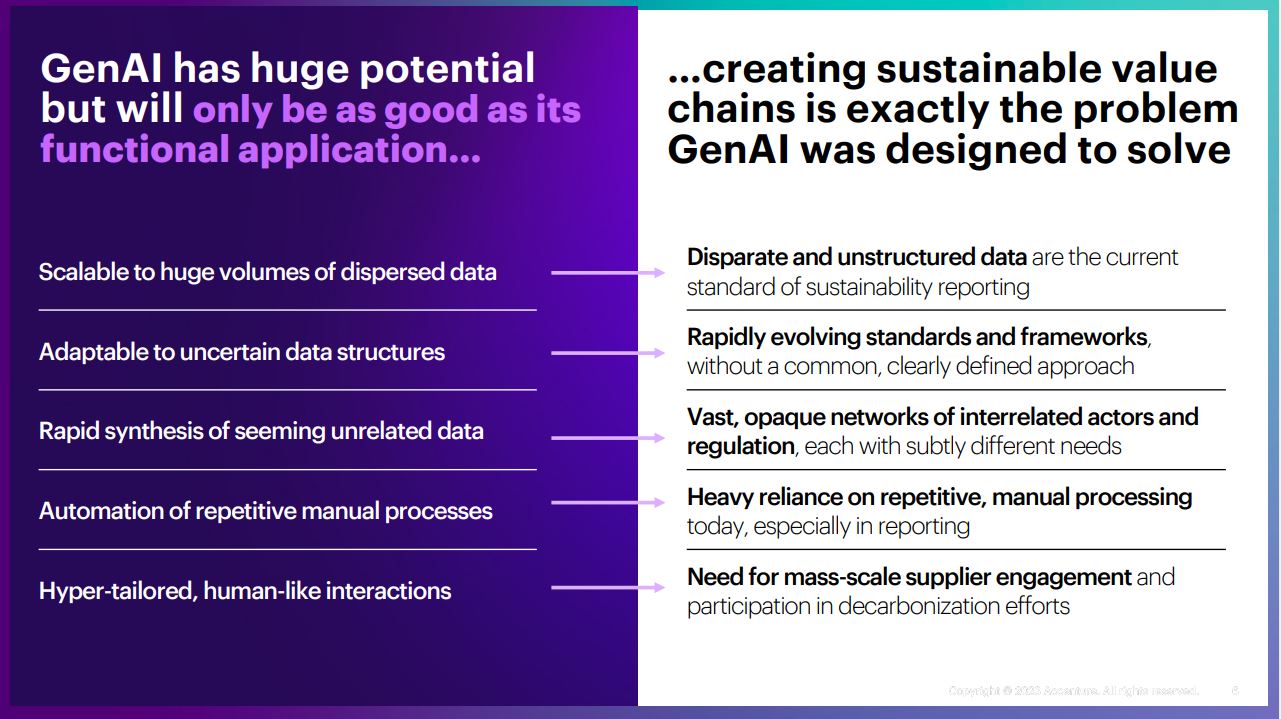
Overall, NEDs conveyed a strong belief in technology’s potential to improve business operations and reduce its carbon emissions, but that realising this potential requires it to be planned for, implemented, and overseen in the right way. In the ‘decade to deliver,’ NEDs’ strengths lie in the ability to ask the right questions and probe boards on what a successful and sustainable tech-enabled future looks like for their organisation, and how it can be delivered.
Dig deeper
How can Generative AI support teams in driving sustainable change and how can Boards step up to the AI challenge? Samantha Barber explores five points for consideration.
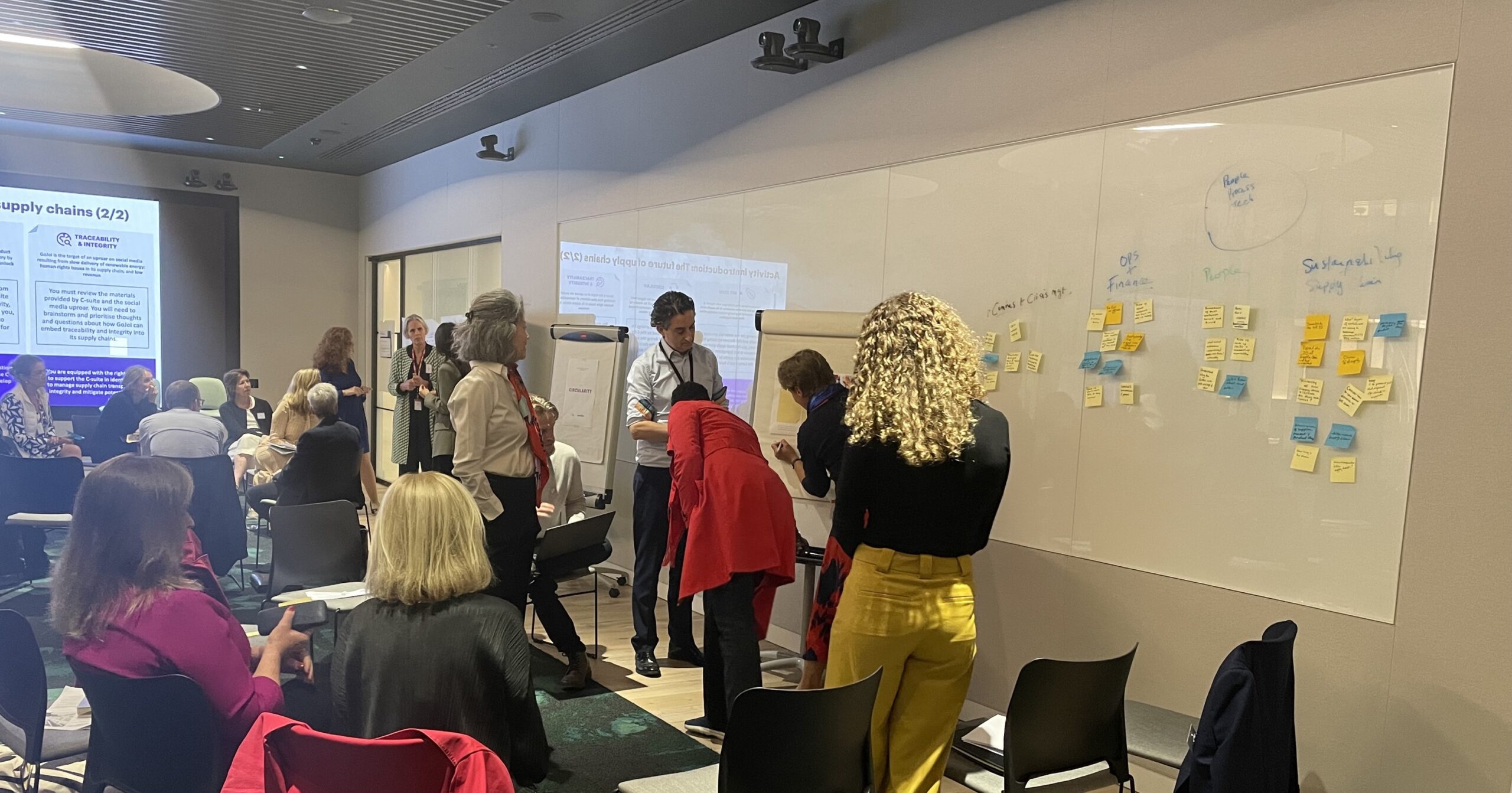
Read more
We ran a similar session with Accenture on 'The future of supply chains', which explored the critical role of supply chains in achieving climate goals, with a focus on sharing practical insights on building resilient and responsible supply networks.
Read the article



